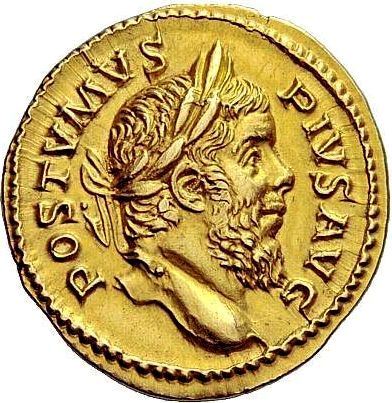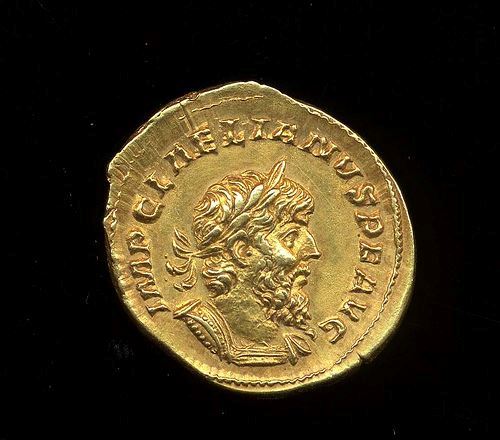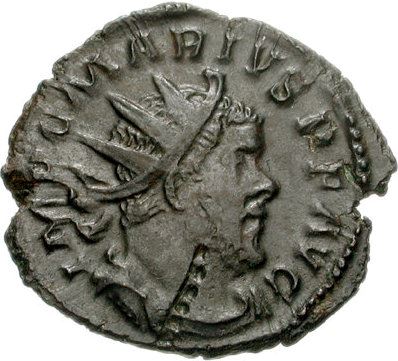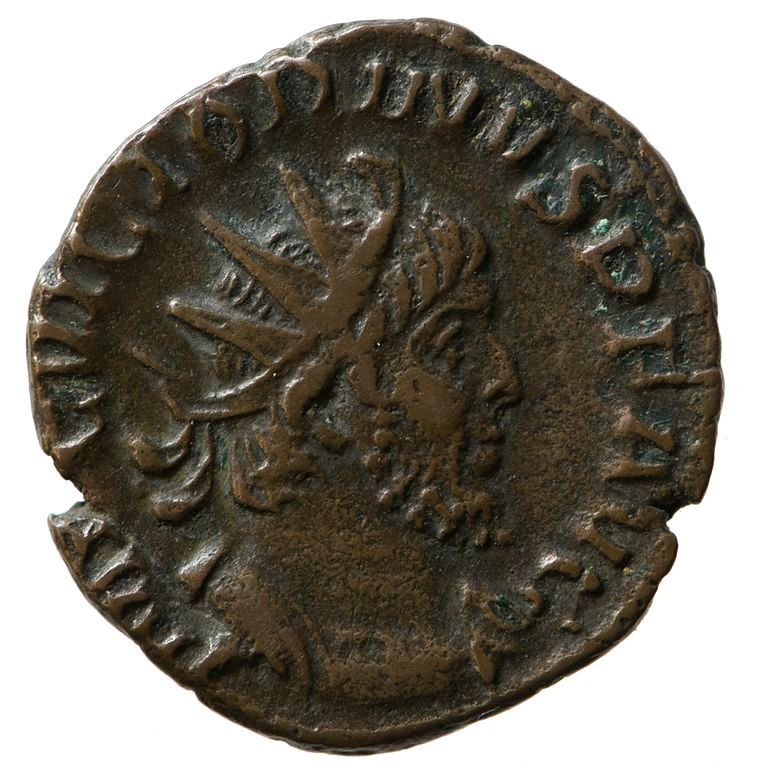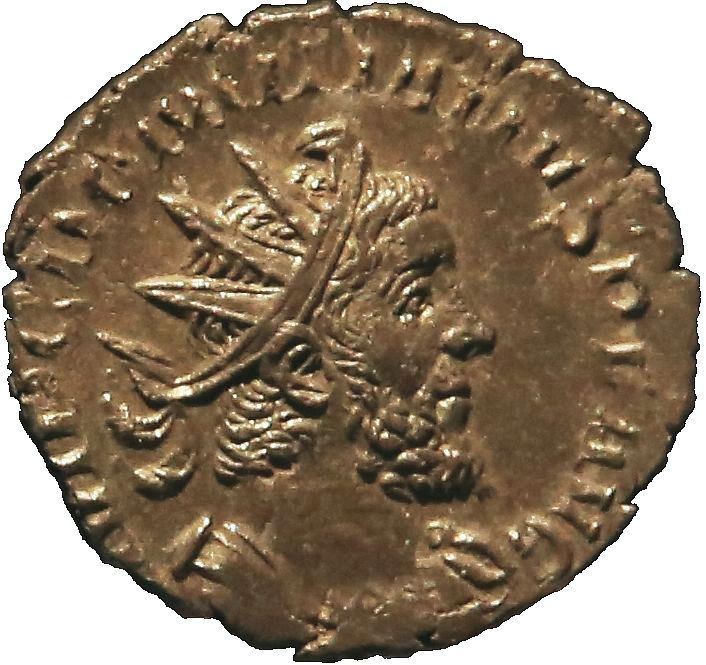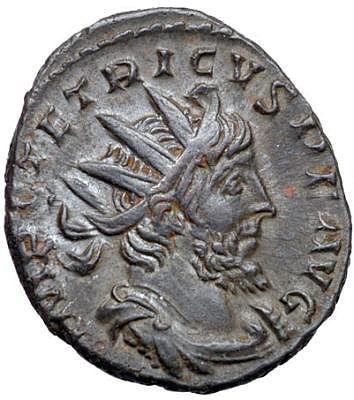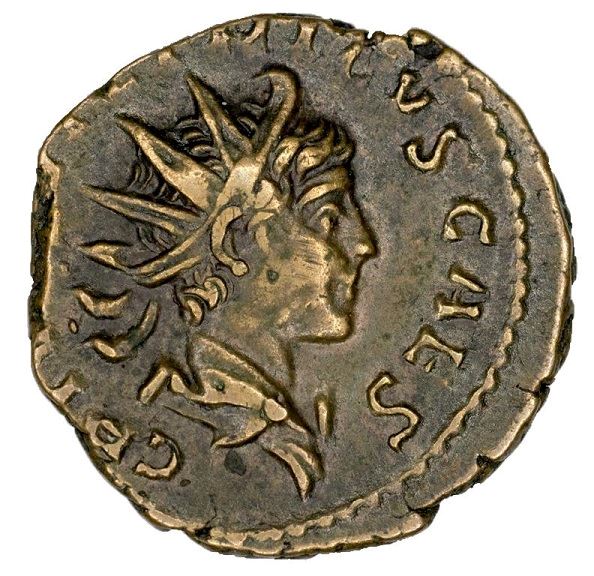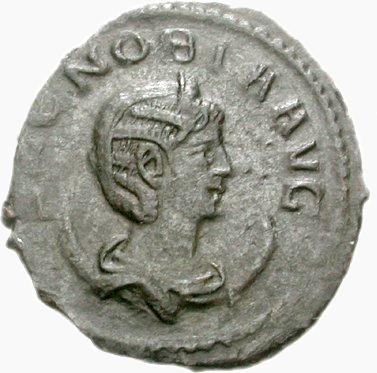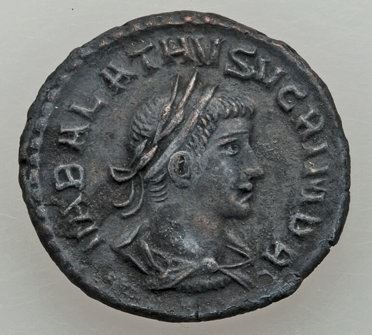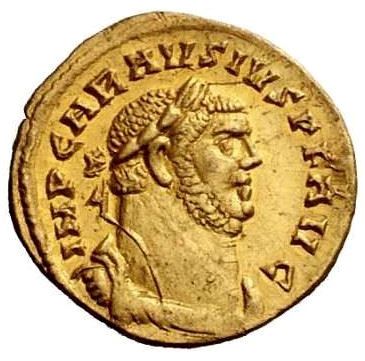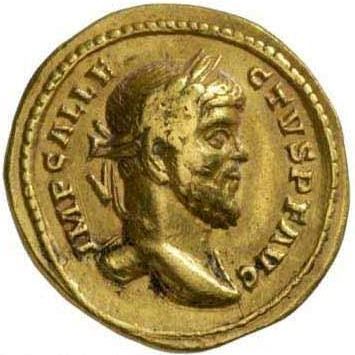During the Crisis of the 3rd Century, the Roman Empire was plagued by a series of bloody civil wars, in addition to plagues, famines, and invasions.
By 268 AD, the Empire had split into three separate states - the Gallic Empire (Gaul, Brittania & Hispania), the Palmyrene Empire (Syria, Palaestina & Aegyptus), and the remains of the Roman Empire covering Italy, Greece & North Africa.
This category covers coins from these seccesionist empires.
By 268 AD, the Empire had split into three separate states - the Gallic Empire (Gaul, Brittania & Hispania), the Palmyrene Empire (Syria, Palaestina & Aegyptus), and the remains of the Roman Empire covering Italy, Greece & North Africa.
This category covers coins from these seccesionist empires.
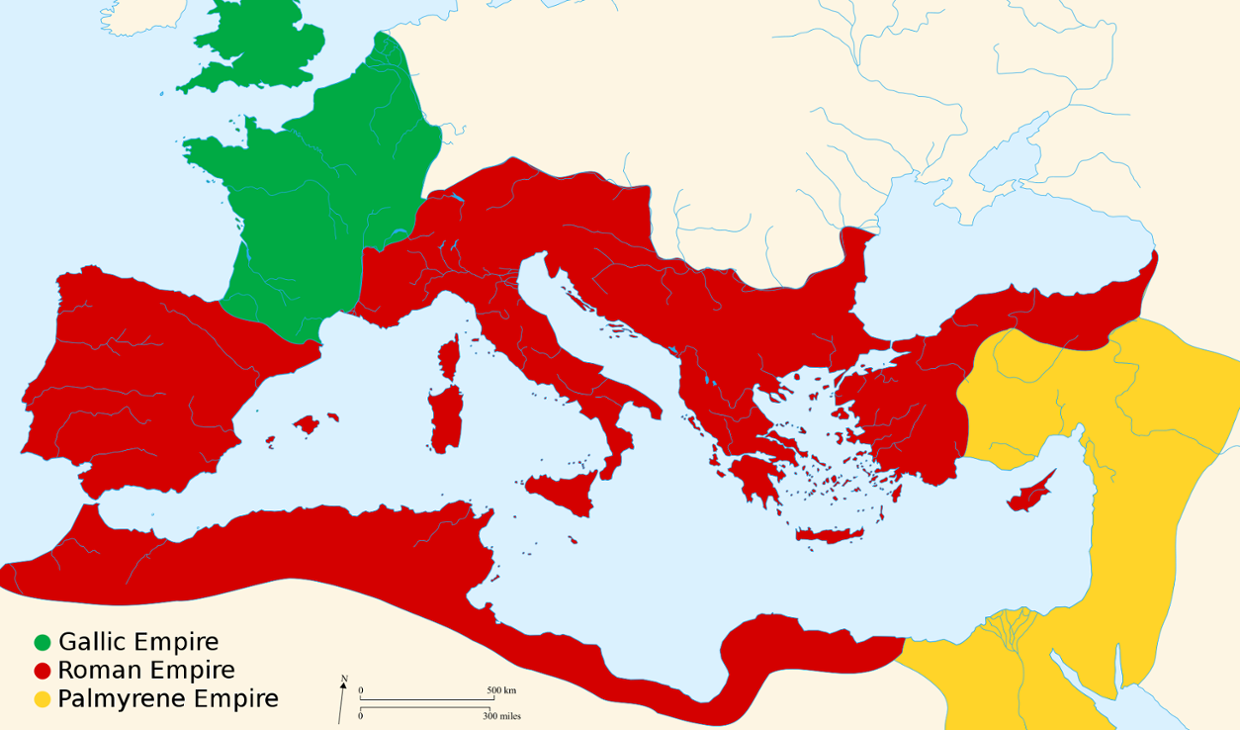
Marcus Cassianius Latinius Postumus was a Roman commander of provincial origin who ruled as emperor in the west.
The Roman army in Gaul threw off its allegiance to Gallienus around the year 260, and Postumus assumed the title and powers of emperor in the provinces of Gaul, Germania, Britannia and Hispania, thereby founding what scholars have dubbed the Gallic Empire.
Followin...
The Roman army in Gaul threw off its allegiance to Gallienus around the year 260, and Postumus assumed the title and powers of emperor in the provinces of Gaul, Germania, Britannia and Hispania, thereby founding what scholars have dubbed the Gallic Empire.
Followin...
Ulpius Cornelius Laelianus was a usurper against Postumus, the emperor of the Gallic Empire.
Laelianus declared himself emperor at Moguntiacum in February/March 269, after repulsing a Germanic invasion.
His rebellion lasted only about two months before he was executed, reputedly by his own soldiers, or by Postumus' troops after the siege of Moguntiacum, which was also fatal ...
Laelianus declared himself emperor at Moguntiacum in February/March 269, after repulsing a Germanic invasion.
His rebellion lasted only about two months before he was executed, reputedly by his own soldiers, or by Postumus' troops after the siege of Moguntiacum, which was also fatal ...
Marcus Aurelius Marius was briefly emperor of the Gallic Empire in 269 following the death of Postumus.
According to tradition, he was a blacksmith by trade, and rose through the ranks of the Roman army to become an officer. He was present with the army that revolted at Moguntiacum (Mainz) after the emperor Postumus refused to allow it to sack the city.
After murdering the em...
According to tradition, he was a blacksmith by trade, and rose through the ranks of the Roman army to become an officer. He was present with the army that revolted at Moguntiacum (Mainz) after the emperor Postumus refused to allow it to sack the city.
After murdering the em...
Marcus Piavonius Victorinus emperor in the Gallic provinces from 268 to 270 or 269 to 271, following the brief reign of Marius.
Hailing from Gaul, Victorinus was born to a family of great wealth, and was a soldier under Postumus. He showed considerable ability and rose swiftly to become co-consul with Postumus in 268.
After engineering the death of Marius, Victorinus was decl...
Hailing from Gaul, Victorinus was born to a family of great wealth, and was a soldier under Postumus. He showed considerable ability and rose swiftly to become co-consul with Postumus in 268.
After engineering the death of Marius, Victorinus was decl...
Domitianus was probably a Roman soldier of the mid-third century AD who was acclaimed emperor, probably in northern Gaul in late 270 or early 271 AD, and struck coins to advertise his elevation.
Given that his reign lasted for, at best, only a few weeks after his acclamation and he does not seem to have secured significant military or political support Domitianus is more properly categ...
Given that his reign lasted for, at best, only a few weeks after his acclamation and he does not seem to have secured significant military or political support Domitianus is more properly categ...
Gaius Pius Esuvius Tetricus was Emperor of the Gallic Empire (Imperium Galliarum), reigning 271-274, succeeding the murdered Victorinus and ending with his surrender on the battlefield to the Roman emperor Aurelian.
Tetricus, who ruled with his son, Tetricus II, was the last of the Gallic emperors.
According to literary sources, after being displayed as trophies at Aurelian'...
Tetricus, who ruled with his son, Tetricus II, was the last of the Gallic emperors.
According to literary sources, after being displayed as trophies at Aurelian'...
Caius Pius Esuvius Tetricus was the son of Tetricus I, Emperor of the Gallic Empire (270-274).
In 273, he was raised to the rank of Caesar, with the title of princeps iuventutis, and in January 274 he started his first consulship, together with his father.
After the defeat and deposition of his father in the autumn of 274, he appeared as a prisoner in Aurelian's triumph, but ...
In 273, he was raised to the rank of Caesar, with the title of princeps iuventutis, and in January 274 he started his first consulship, together with his father.
After the defeat and deposition of his father in the autumn of 274, he appeared as a prisoner in Aurelian's triumph, but ...
Septimia Zenobia was queen of the Syria-based Palmyrene Empire. She was born to a noble Palmyrene family and married the ruler of the city, Odaenathus. After Odaenathus' assassination, Zenobia became the regent of her son Vaballathus and held de facto power throughout his reign.
In 270, Zenobia launched an invasion which brought most of the Roman East under her sway and culminated with ...
In 270, Zenobia launched an invasion which brought most of the Roman East under her sway and culminated with ...
Lucius Julius Aurelius Septimius Vaballathus Athenodorus was king of the Palmyrene Empire centered at Palmyra, Syria, who came to power as a child, ruling with his regent, his mother Queen Zenobia.
Initially the Roman Emperor Aurelian recognized Vaballathus' rule, and early coins issued by Zenobia under Vaballathus's name, also acknowledge Aurelian as emperor.
Zenobia, howeve...
Initially the Roman Emperor Aurelian recognized Vaballathus' rule, and early coins issued by Zenobia under Vaballathus's name, also acknowledge Aurelian as emperor.
Zenobia, howeve...
Marcus Aurelius Mausaeus Valerius Carausius was a military commander of the Roman Empire in the 3rd century, who usurped power in 286.
He declared himself emperor in Britain and northern Gaul (Imperium Britanniarum), only 13 years after the Gallic Empire was ended in 273.
He held power for seven years, fashioning the name "Emperor of the North" for himself, before being assas...
He declared himself emperor in Britain and northern Gaul (Imperium Britanniarum), only 13 years after the Gallic Empire was ended in 273.
He held power for seven years, fashioning the name "Emperor of the North" for himself, before being assas...
Allectus was a Roman-Britannic usurper-emperor in Britain and northern Gaul from 293 to 296.
Allectus was treasurer to Carausius, a Menapian officer in the Roman navy who had seized power in Britain and northern Gaul in 286. In 293 Carausius was isolated. Allectus assassinated Carausius and assumed command himself.
Allectus was defeated by an expeditionay force led by Constan...
Allectus was treasurer to Carausius, a Menapian officer in the Roman navy who had seized power in Britain and northern Gaul in 286. In 293 Carausius was isolated. Allectus assassinated Carausius and assumed command himself.
Allectus was defeated by an expeditionay force led by Constan...

